List of war deities
A war god in mythology associated with war, combat, or bloodshed. They occur commonly in both monotheistic and polytheistic religions.
_-_Musei_Capitolini_-_MC0058_(2).JPG.webp)
Mars, the Roman god of war
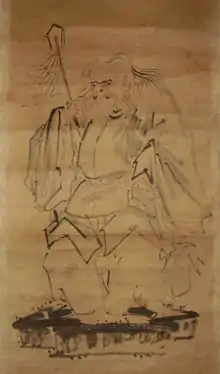
Sarutahiko.
Unlike most gods and goddesses in polytheistic religions, monotheistic deities have traditionally been portrayed in their mythologies as commanding war in order to spread their religion. (The intimate connection between "holy war" and the "one true god" belief of monotheism has been noted by many scholars, including Jonathan Kirsch in his book God Against The Gods: The History of the War Between Monotheism and Polytheism and Joseph Campbell in The Masks of God, Vol. 3: Occidental Mythology.) [1][2]
The following is a list of war deities:
Africa
Egyptian
- Anhur, god of war, not a native god
- Bast, cat-headed goddess associated with war, protection of Lower Egypt and the pharaoh, the sun, perfumes, ointments, and embalming
- Horus, god of the king, the sky, war, and protection
- Maahes, lion-headed god of war
- Menhit, goddess of war, "she who massacres"
- Montu, falcon-headed god of war, valor, and the Sun
- Neith, goddess of war, hunting, and wisdom
- Pakhet, goddess of war
- Satis, deification of the floods of the Nile River and an early war, hunting, and fertility goddess
- Sekhmet, goddess of warfare, pestilence, and the desert
- Set, god of the desert and storms, associated with war
- Sobek, god of the Nile, the army, military, fertility, and crocodiles
- Sopdu, god of the scorching heat of the summer sun, associated with war
- Wepwawet, wolf-god of war and death who later became associated with Anubis and the afterlife
Ethiopian
- Maher, god of war.
Kenya
Kalenjin
- Boryet, Kipsigis Death-wielding god of war. Boryet (also luket) is the act of war. Death (Me'et) is observed as a consequence of war. War is thus personified as such.
Europe
Baltic
- Kara Māte, Latvian goddess of war
- Kauriraris, Lithuanian god of war and war steeds
- Junda, Lithuanian goddess of war
Slavic
- Jarovit, god of vegetation, fertility, and spring, also associated with war and harvest
- Perun, god of thunder and lightning, associated with war
- Svetovid, god of war, fertility, and abundance
- Zorya Utrennyaya, goddess of the morning star, sometimes depicted as a warrior goddess who protected men in battle
Celtic
- Agrona, reconstructed Proto-Celtic name for the river Aeron in Wales, and possibly the name of an associated war goddess
- Alaisiagae, a pair of goddesses worshiped in Roman Britain, with parallel Celtic and Germanic titles
- Andarta, Brittonic goddess theorized to be associated with victory, overcoming enemies, war
- Andraste, Gaulish warrior goddess
- Anann, Irish goddess of war, death, predicting death in battle, cattle, prosperity, and fertility
- Badb, Irish goddess of war who took the form of a crow; member of the Morrígan
- Bandua, Gallaecian God of War
- Belatucadros, war god worshipped by soldiers and equated with the Roman war god Mars
- Camulus, god of war of the Belgic Remi and British Trinovantes
- Catubodua, Gaulish goddess assumed to be associated with victory
- Cicolluis, Gaulish and Irish god associated with war
- Cocidius, Romano-British god associated with war, hunting and forests
- Macha, Irish goddess associated with war, horses, and sovereignty; member of the Morrígan
- The Morrígan, Irish triple goddess associated with sovereignty, prophecy, war, and death on the battlefield
- Neit, Irish god of war, husband of Nemain of Badb
- Nemain, Irish goddess of the frenzied havoc of war; member of the Morrígan
- Rudianos, Gaulish god of war
- Segomo, Gaulish god of war
- Teutates, British and Gaulish god of war and the tribe
Lusitanian
- Neto, god believed to be associated with war, death, and weaponry
Norse-Germanic
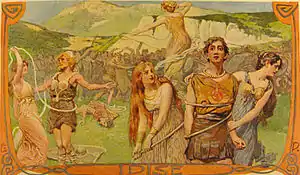
Idise by Emil Doepler.
Continental Germanic
- Baduhenna, a western Frisii goddess of warfare
- Idis (Germanic)/itis/ides, the West Germanic cognates of North Germanic dís, they are connected with battle magic and fettering enemy armies
- Sandraudiga, goddess whose name may mean "she who dyes the sand red", suggesting she is a war deity or at least has a warrior aspect
- Týr, god of war, single combat, law, justice, and the thing, who later lost much of his religious importance and mythical role to the god Wōden
- Wōden, god associated with wisdom, poetry, war, victory, and death
Norse
- Dís, a group of lesser goddesses who are sometimes connected with battle magic; valkyrie may be a kenning for them
- Freyja, goddess associated with love, beauty, fertility, gold, seiðr, war, and death
- Odin, god associated with wisdom, war, battle, and death
- Týr, god associated with law, justice, victory, and heroic glory
- Ullr, god associated with archery, skiing, bows, hunting, single combat, and glory
- Valkyries, choosers of the slain and connected to Odin, ruler of Valhalla; they may be the same as the dís above
Greek / Hellenic
- Alala, spirit of the war cry
- Alke, spirit of courage and battle-strength
- Amphillogiai, goddesses of disputes
- Androktasiai, spirits of battlefield slaughter
- Ares, the main Greek god of war, despised by all the city-states except Sparta
- Athena, goddess of wisdom, war strategy, and weaving, more beloved by ancient Greeks than Ares and tutelary deity of Athens, Sparta's rival
- Bia, spirit of force and compulsion
- Deimos, personification of terror
- Enyalius, god of war; in early periods apparently an epithet of Ares, they were differentiated later
- Enyo, goddess of war, sometimes appears to be identical to Eris
- Eris, goddess of discord and strife
- Hera, in the Illiad she has a martial character and fights (and wins) against Artemis; however, this warlike aspect of her appears nowhere else in the surviving corpus, suggesting it was dropped early on
- Homados, spirit of the din of battle
- Hysminai, female spirits of fighting and combat
- Ioke, spirit of onslaught, battle-tumult, and pursuit
- Keres, female spirits of violent or cruel death, including death in battle, by accident, murder, or ravaging disease
- Kratos, personification of strength and power
- Kydoimos, spirit of the din of battle
- Makhai, male spirits of fighting and combat
- Nike, spirit of victory
- Palioxis, spirit of backrush, flight, and retreat from battle
- Pallas, Titan god of war-craft and of the springtime campaign season
- Perses, the Titan of destruction
- Phobos, spirit of panic, fear, flight, and battlefield rout
- Phonoi, spirits of murder, killing, and slaughter
- Polemos, spirit of war
- Proioxis, spirit of onrush and battlefield pursuit
Roman
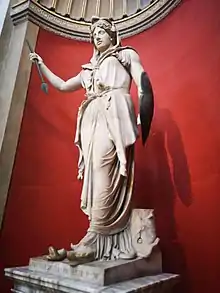
Juno Sospita Statue holding a spear and shield.
- Bellona, goddess of war
- Honos, god of chivalry, honor, and military justice
- Juno, has a consistent martial character and the patron goddess of Rome, the mother of Mars and Bellona
- Mars, god of war and agriculture, equivalent to Ares as far as being war gods; aside from this they have very little in common
- Minerva, goddess of wisdom, medicine, music, crafts, and war, while somewhat equivalent to the Greek Athena, the Romans did not emphasize her war aspect like the Greeks did
- Nerio, warrior goddess and personification of valor
- Victoria, personification of victory, equivalent to the Greek goddess Nike
- Virtus, god of bravery and military strength
Etruscan
Balkan
- Danubian Rider
- Sabazios
- Thracian Rider
Hungarian
- Hadúr, god of war and the metalsmith of the gods
Asia
Turkic
- Kyzaghan, Turkic deity of war
Mongolian
Chinese
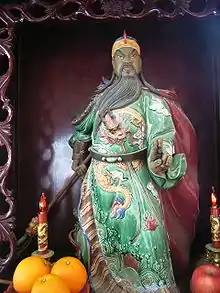
Guan Yu, Chinese god of loyalty, righteousness, and valor.
- Ba Yikao, Pole Star of Purple Subtlety Emperor. God of Military Outcomes
- Chiyou, god of war
- Di Qing, Star of Military Fortune, God of Valor
- Erlang Shen, a three-eyed warrior
- Guan Yu, Han dynasty general. God of loyalty, righteousness, and valor.
- Jinzha, marshal of the center altar
- Jiutian Xuannü, goddess of war, sex, and longevity [4]
- Li Jing, Guardian of Celestial Palace
- Muzha, marshal of the center altar
- Nezha
- Wang Shan, Song dynasty general. Primordial Lord-General of Heaven. Guardian of Celestial Palace
- Wen Qiong [5]
- Yue Fei
- Zhao Lang (Zhao Gongming), God of Military Fortune, Guardian of Celestial Palace, Protector of Households
Japanese
- Futsunushi, god of swords, martial arts, and conquest; god of the Mononobe clan
- Hachiman Daimyōjin, Shinto god of war (on land) and agriculture, divine protector of the Minamoto clan; mostly worshiped by samurai
- Sarutahiko, god of war and misogi; the deity who stands at the junction of Heaven and Earth; one of the main Kunitsukami; actively worshipped by Ueshiba Morihei
- Takemikazuchi, god of war, conquest, martial arts, sumo, and lightning; general of the Amatsukami; god of Kashima and Ujigami of Nakatomi clan
- Suwa Myōjin (Takeminakata-no-kami), god of valor and duty, protector of the Japanese religion
- Bishamonten, Buddhist god of war
Korean
- Yi Sun-sin, admiral of Joseon Dynasty. god of military, guardian of sea.
- Choe Yeong, general of Goryeo period, god of shamans, protector of humanity.
- Pagunseong, the star at the edge of the Big Dipper in Taoism, symbolizing swords.
- Baekmashinjang, god of war who rides a white horse.
- Dungapshinjang, god of war who has the ability of shapeshifting.
- Byeorakshinjang, god of war who uses thunder and lightning, sometimes punishes the evil.
- Damuncheonwang, Buddhist god of war.
Filipino
- Chacha’: the Bontok god of warriors[6]
- Hipag: the Ifugao spirits of war that give soldiers courage on the field of war but are ferocious and cannibalistic[7]
- Apolaqui: the Pangasinense war god[8]
- Aring Sinukûan: the Kapampangan sun god of war and death, taught the early inhabitants the industry of metallurgy, wood cutting, rice culture and even waging war[9]
- Apolake: the Tagalog god of sun and warriors[10]
- Sidapa: the Tagalog god of war who settles disputes among mortals[11]
- Doce Pares: the twelve brave young Tagalog men who embarked on a quest to retrieve the Golden Calf of Banahaw, together with the culture-hero Rizal; said to return to the people as giants, together with the Golden Calf, to aid their people in war[12]
- Balangaw: the rainbow; a Hiligaynon and Bisaya god of war[13]
- Inaginid: a Hiligaynon and Bisaya god of war[14]
- Makanduk: a Hiligaynon and Bisaya god of war[15]
- Lumalayag: Tagbanwa spirit warriors who challenge and fight the Salakap, spirits of the epidemic sickness[16]
- Talagbusao: the bloodthirsty Bukidnon god of war[17]
- Pamdiya: the Manobo divinities who have purview over war; initiate war[18]
- Darago: the Bagobo god of warriors married to Mandarangan[19]
- Mandarangan: the Bagobo god of warriors married to Darago; resides at Mount Apo's summit; human sacrifices to him are rewarded with health, valor in war, and success in the pursuit of wealth[20]
Vietnamese
- Cao Lỗ, god of military innovations
- Độc Cước, the protector of coastal settlements. Legend has it that he split himself in two with his axe, each half guards coastal villages against sea ogres.
- Thần Đồng Cổ, the armored protector of the Lý dynasty
- Thánh Gióng, god of triumph over foreign invaders
Hindu-Vedic-and-non-Vedic
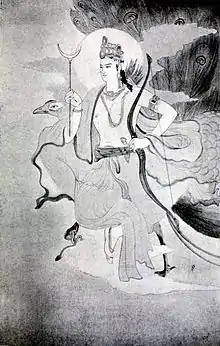
Kartikeya, god of war by Surendra Nath Ganguly, 1913.
- Kartikeya, god of war and battle
- Mangala, god of war
- Nirrti, goddess of strife
- Parvati, her forms Durga and Kali are known for fighting demons
- Shiva, several of his avatars are gods of avenging and destroying
- Vishnu, god of protection. Several of his avatars are associated with fighting and vanquishing evil.
- Indra, god of power, kingship, thunder, rains, electricity and the senses. He is also the king of the Hindu gods.
Manipuri
Armenian
- Anahit, goddess of healing, fertility, wisdom, and water; in early periods associated with war
Canaanite
Hittite
- Shaushka, goddess of fertility, war, and healing
- Wurrukatte, god of war
Nuristani
- Great Gish, god of war
Mesopotamian
- Agasaya, "the Shrieker", goddess of war
- Belus, Babylonian god of war
- Inanna, Sumerian goddess of fertility, sex and war
- Ishtar, Assyrian, Akkadian, and Babylonian counterpart to Inanna
- Nergal, Babylonian god of war, fire, the underworld, and pestilence
- Pap-nigin-gara, Akkadian and Babylonian god of war
- Sebitti, group of minor Akkadian and Babylonian war gods
- Shala, Akkadian and Babylonian goddess of war and grain
- Shara, minor Sumerian god of war
- Shulmanu, god of the underworld, fertility, and war
Oceania
Māori
- Maru, god of war and fresh water
- Tūmatauenga, god of war and human activities
Americas
Great Plains
- Morning Star, O-pi-ri-kus by one spelling; the god of war in Pawnee mythology
Pacific Northwest
- Qamaits, Nuxálk warrior goddess
- Winalagalis, Kwakwaka'wakw god of war
Aztec
- Patterns of War
- Huitzilopochtli, god of will, patron of war, fire, and sun; lord of the south
- Mixcoatl, god of war and hunting
- Tlaloc, god of thunder, rain, and earthquakes
- Xipe-Totec, god of force, patron of war, agriculture, vegetation, diseases, seasons, rebirth, hunting, trades, and spring; lord of the east
- Xiuhtecuhtli, god of fire
Mayan
- Tohil, god associated with fire, the sun, rain, mountains, and war
References
- Kirsch, J. (2004). God Against the Gods: The History of the War Between Monotheism and Polytheism. Viking Compass. ISBN 9780670032860. Retrieved 2015-06-22.
- "Occidental Mythology (Masks of God): Joseph Campbell: 9780140194418: Amazon.com: Books". amazon.com. Retrieved 2015-06-22.
- Morris, Arnold Hugh Martin Jones, John Robert: The Prosopography of the Later Roman Empire p. 612
- Cahill, Suzanne E. (18 July 2013). "Sublimation in Medieval China: The Case of the Mysterious Woman of the Nine Heavens". Journal of Chinese Religions. 20 (1): 91–102. doi:10.1179/073776992805307692.
- http://etheses.lib.cuhk.edu.hk/pdf/004777762.pdf%5B%5D
- Cawed, C. (1972). The Culture of the Bontoc Igorot. Manila: MCS Enterprises .
- Jocano, F. L. (1969). Philippine Mythology. Quezon City: Capitol Publishing House Inc.
- Aduerte, D. (2014). The Philippine Islands, 1493–1898: Volume XXXII, 1640. CreateSpace Independent Publishing.
- Nicdao, A. (1917). Pampangan Folklore. Manila.
- Calderon, S. G. (1947). Mga alamat ng Pilipinas. Manila : M. Colcol & Co.
- Demetrio, F. R., Cordero-Fernando, G., & Zialcita, F. N. (1991). The Soul Book. Quezon City: GCF Books.
- Mojares, R. B. (1974). Philippine Quarterly of Culture and Society Vol. 2, No. 3: The Myth of the Sleeping Hero: Three Philippine Cases. University of San Carlos Publications.
- Loarca, Miguel de. (1582) 1903. Relation of the Filipinas Islands. In Blair and Robertson, The Philippine Islands 5.
- Loarca, Miguel de. (1582) 1903. Relation of the Filipinas Islands. In Blair and Robertson, The Philippine Islands 5.
- Loarca, Miguel de. (1582) 1903. Relation of the Filipinas Islands. In Blair and Robertson, The Philippine Islands 5.
- Fox, R. B. (1982). Religion and Society Among the Tagbanuas of Palawan Island, Philippines. Manila: National Museum.
- Jocano, F. L. (1969). Philippine Mythology. Quezon City: Capitol Publishing House Inc.
- Jocano, F. L. (1969). Philippine Mythology. Quezon City: Capitol Publishing House Inc.
- Demetrio, F. R., Cordero-Fernando, G., & Zialcita, F. N. (1991). The Soul Book. Quezon City: GCF Books
- Demetrio, F. R., Cordero-Fernando, G., & Zialcita, F. N. (1991). The Soul Book. Quezon City: GCF Books
This article is issued from Wikipedia. The text is licensed under Creative Commons - Attribution - Sharealike. Additional terms may apply for the media files.